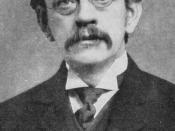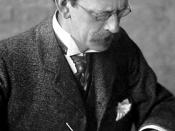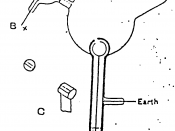Joseph John Thomson was born in Cheetham Hill, near Manchester, England on December 18, 1856. His father was a bookseller and a publisher. Having discovered a liking for physics, he wanted to become an engineer. His family supported him, and so while waiting for an opening in the apprentices at the engineering firm, Thomson was sent to Owens College when he was 14. His father died 2 years later. His mother could not afford the premium, so he gave up engineering and stayed at the college with the help of small scholarships. Thomas Barker, his professor of mathematics saw a bright mind in Thomson, and advised him to stay at the College to work for an entrance scholarship offered at his old school, Trinity, which was one of the most prestigious colleges in Cambridge University.
Thomson won entrance into the college in 1876. In 1880, he finished second in his class (behind Joseph Larmor, who also was tutored by the well-known E.J.
Routh) in the grueling graduation examination in mathematics, and was accepted into Fellowship in the same year. He began work in the Cavendish Laboratory under Lord Rayleigh. When Rayleigh resigned the Cavendish chair in 1884, Thomson was elected to it, despite the fact that he was only 28 at the time, and was known more for his mathematical ability than for his skill in experimental physics. The appointment was not universally approved; however it proved to be an inspired choice. Under his guidance, Cavendish soon attracted students from all over the world. His experiments on the discharge of electricity through gases at low pressure led to the discovery of the electron in 1897, one of the most significant events in science. He won the Nobel Prize in 1906.
By 1855, people had already discovered that if they took...


